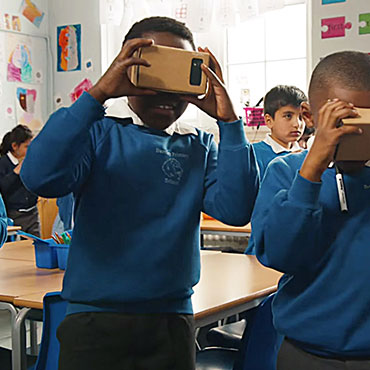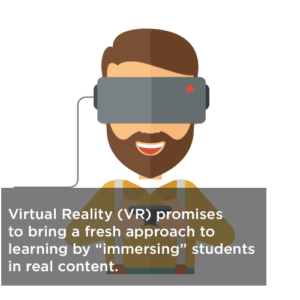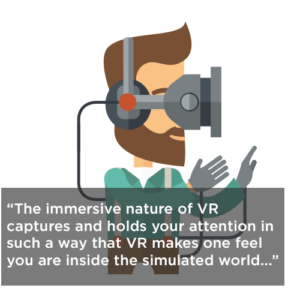
How Virtual Reality Impacts Our Learning Through Emotions
[vc_row][vc_column width=”1/2″][vc_column_text css_animation=”appear”]
Have you ever felt like you are confused, bored, and not motivated in a course?
[/vc_column_text][/vc_column][vc_column width=”1/2″][vc_column_text css_animation=”bottom-to-top”]
Or, have you ever felt like you really never learned anything, just memorized the information, took a test on it, and then forgot everything?
Even, have you ever wished that instead of listening to your teacher, you just wanted to don those goggles and combine all those chemicals and liquids until you get what you want?
[/vc_column_text][/vc_column][/vc_row][vc_row][vc_column][vc_separator][vc_column_text]
A learner usually has these feelings in a classroom; she or he may experience an entire year of tremendous boredom during a class. However,  Virtual Reality (VR) promises to bring a fresh approach to learning by “immersing” students in real content. “Immerse” is the key word here because immersive experiences create memory and inspire action by appealing to all the senses. Because VR ignites all our senses, it provides interactive and “immersive” experiences that engage learners and creates a more powerful and lasting memory, which affects our learning.
Virtual Reality (VR) promises to bring a fresh approach to learning by “immersing” students in real content. “Immerse” is the key word here because immersive experiences create memory and inspire action by appealing to all the senses. Because VR ignites all our senses, it provides interactive and “immersive” experiences that engage learners and creates a more powerful and lasting memory, which affects our learning.
How do our emotions affect learning?
The developments in cognitive sciences are unrevealing the mysteries of how and where our brain processes emotion and how emotion affects our learning deeply. Research demonstrates the importance of emotion in learning as emotion drives attention, which in turn drives learning and memory.
Two main parts of our brain regulate our emotions: the limbic system and the cerebral cortex. Our limbic system plays an important role in regulating our emotions and processing our memory. Our limbic system is so strong that we are more inclined to follow our emotions than our rational thoughts. On the other hand, our cerebral cortex helps us make rational decisions based on the interpretation of sensory information. The main function of the cerebral cortex is to regulate our emotions and judgments. So what is the connection between our emotions and learning?
Our emotional state affects our memory, and our memory is related to our learning. We recall our memories easily later on when these memories form during a specific emotional state. The chances are greater that you remember a rock climbing experience than you remember a lecture about rock climbing because you experience different emotions during the actual action. Research and our own experience as learners confirm that emotional reactions powerfully influence how much is learned. Our emotional state determines how much we will engage in and be willing to invest in your learning. Therefore, anybody who teaches and creates an educational program should not underestimate the power of emotions in our learning.
The relationship between virtual reality and emotions and learning
How will VR affect the relationship between learning and emotions? VR can emotionally change and enhance learning, at least, in two ways: tricking the brain and enabling the social interaction.
 One of the VR promises is to replace and amplify real experiences with guided ones so that real world aspects can be replicated in a fully interactive fashion. The immersive nature of VR captures and holds your attention in such a way that VR makes one feel you are inside the simulated world, even your brain perceives you are actually there; this perception ignites your limbic system and cortex. Once your limbic system and cortex are activated, one tends to remember information or experience when they are perceived in a context. In other words, our memories are contextual. Contextual memory helps us recall the information during closely related events in the real world or in a simulation. Once you are emotionally engaged, and your brain believes that you are there, it changes your mood and strengthens your memory. That’s exactly what VR brings to the table.
One of the VR promises is to replace and amplify real experiences with guided ones so that real world aspects can be replicated in a fully interactive fashion. The immersive nature of VR captures and holds your attention in such a way that VR makes one feel you are inside the simulated world, even your brain perceives you are actually there; this perception ignites your limbic system and cortex. Once your limbic system and cortex are activated, one tends to remember information or experience when they are perceived in a context. In other words, our memories are contextual. Contextual memory helps us recall the information during closely related events in the real world or in a simulation. Once you are emotionally engaged, and your brain believes that you are there, it changes your mood and strengthens your memory. That’s exactly what VR brings to the table.
The other benefit of VR is to allow social interaction to enhance learning. You and your friends can interact in a virtual world, even, when you are geographically separated. Imagine this is as a teleportation to another place in a virtual world. Using VR makes collaboration, problem-solving, or other group activities possible, which these methods are accepted as good instructional strategies.
In conclusion, VR, as a medium, has the potential to improve and enhance our learning experience by regulating our emotions. I believed that VR might, actually will, change the world of education because it offers what learners need. I also expect to see virtual reality learning to be more effective and efficient than ever. But, what is next? How will VR truly affect learning? Eventually, we will see.
Author: Filiz Aktan P.hD candidate
[/vc_column_text][/vc_column][/vc_row][vc_row][vc_column][/vc_column][/vc_row]
Comments (16)
-
betanocasino
Betanocasino is where its at! Great bonuses and promotions going on all the time like at betanocasino. The platform’s easy to use too. No complaints from me. Just winnings!
-
fc188login
Alright, fc188login login was pretty straightforward. Didn’t have any issues getting in and messing around. If you’re trying to get logged in, peep fc188login.
-
p9999gamedownload
p9999gamedownload is a solid place for game downloads. Quick and easy, no crazy hoops to jump through. I like it. Get the newest version at p9999gamedownload.
-
golo786game
Golo786game, you’ve got my attention! Found some cool games here that I haven’t seen anywhere else. The site’s easy to navigate, which is a big plus. Gonna keep playing and see if I get lucky. Check out golo786game if you want something fresh.
-
luck33gameappk
Alright, gamers, I spent some time with luck33gameappk. The app’s interface is pretty smooth and I was able to dive into playing games pretty quickly. I’d say it’s worth a shot if you are looking for something new to play. Go check it out here: luck33gameappk
-
strayvideojuego
Hey everyone! I looked into strayvideojuego and it caught my eye. The details and information provided make it a helpful place. Come take a look for yourself here! : strayvideojuego
-
-
binance open account
I don’t think the title of your article matches the content lol. Just kidding, mainly because I had some doubts after reading the article.
-
Créer un compte Binance
I don’t think the title of your article matches the content lol. Just kidding, mainly because I had some doubts after reading the article.
-
Създаване на безплатен профил
Thanks for sharing. I read many of your blog posts, cool, your blog is very good. https://www.binance.com/register?ref=IHJUI7TF
-
betbusslots
I’m trying my luck on betbusslots right now. The slots are pretty fun, and there are some cool bonuses happening. Maybe I’ll hit the jackpot! Visit them at betbusslots.
-
goal11login
Yo, goal11login is pretty straightforward. Navigation is friendly, making it easier to place your bets. Worth checking, man! See for yourself: goal11login


vipphlogin
Vipphlogin is super easy to use, mga bro. No need to be techy to get the hang of it. If you’re in the Philippines and need a reliable login solution, this is it! Sulit! vipphlogin